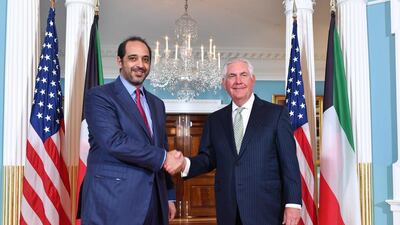WASHINGTON // US secretary of state Rex Tillerson has stepped up his engagement in the Qatar dispute, holding separate talks in Washington with visiting Qatari and Kuwaiti officials.
He met first on Tuesday with Qatari foreign minister Sheikh Mohammed bin Abdulrahman Al Thani, shortly before holding talks with Kuwaiti minister of state for cabinet affairs Sheikh Mohammad Abdullah Al Sabah, whose country has taken on the role of mediator.
During his meeting with Sheikh Mohammed, Mr Tillerson reaffirmed his strong support for Kuwait’s efforts to mediate the dispute between Qatar and Saudi Arabia, the UAE, Bahrain, and Egypt, and urged the parties to remain open to negotiation as the best way to resolve the dispute, the US state department said.
The two men “agreed that stopping terrorism and confronting extremism should be our shared and primary focus”.
Mr Tillerson later attended a working dinner hosted by Kuwaiti ambassador to the US Salem Abdullah Al Jaber Al Sabah. UN secretary general Antonio Guterres, who has offered to help resolve the row, also attended.
Mr Tillerson’s meetings came as Saudi Arabia’s foreign minister Adel Al Jubeir, also on a visit to the US capital, voiced his concern over Qatar’s dealings with Iran.
“There are things that the Qataris are doing with Iran that I would rather not get into,” Mr Al Jubeir said in Washington on Tuesday.
“When we said downgrade [ties with Iran] we said don’t deal with Iran’s Revolutionary Guard and don’t deal with Iranian intelligence,” he said, referring to the first of 13 demands made to Qatar by Saudi Arabia, the UAE, Bahrain and Egypt. “We said any commercial dealings with Iran have to be within international and UN sanctions put on Tehran.”
Referring to the deal Qatar made with Iraqi groups in April in exchange for Qatari hostages, Mr Al Jubeir added: “This idea that you can fund extremist or terrorist groups ... pay ransom to Shia militias, send US$300 million (Dh1.1bn) to Iraq and most of it ending with Quds force in Iran is not acceptable.”
Mr Al Jubeir made it clear that cutting all ties with Iran is not the goal of Gulf states, however, rather it’s for “Qatar to cease these activities, because you can’t be on both sides of the issue”.
Asked about the US base at Qatar’s Al Udeid airbase, Mr Al Jubeir said he welcomed the fact that “the US has security relations with all the Gulf countries and these are very important for the Gulf”.
He referred questions on the US giving mixed signals in its handling of the crisis to the Trump administration but said, “there is no country in the world that doesn’t want Qatar to stop what it’s doing, including the United States”.
The foreign minister, on his second trip to Washington in less than two weeks, applauded Kuwait’s mediation efforts, but said the UAE’s US ambassador, Yousef Al Otaiba, was right in describing the demands to Qatar as non-negotiable.
“We made our point, we took our steps and it’s up to the Qataris to amend their behavior,” he said. “If they don’t, they will remain isolated ... and if Qatar wants to get back to the GCC fold it knows what to do.”
Asked whether this approach will drive Qatar into Iran’s arms, Mr Al Jubeir said: “With regards to who Qatar deals with, they want to deal with Iran, they can do that at their own peril, I don’t know anyone who has dealt with them and had a positive experience.”
From the perspective of Saudi Arabia, he said, “we don’t have to deal with a country that has done harm to us, they have to change their behavior and that’s where we are”.
On the question of what specifically will happen after the 10 day-deadline given for Qatar to respond to the 13-point list of demands, Mr Al Jubeir simply said: “We will have to see.”
foreign.desk@thenational.ae
* With additional reporting by Agence France-Presse

